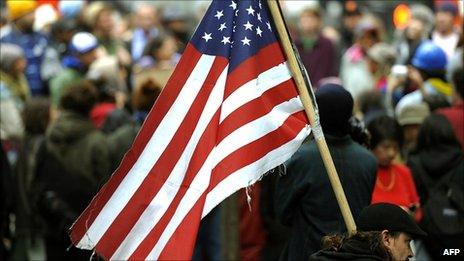Is Occupy Wall Street bad for the American Dream?
- Published

Both Occupy Wall Street and their conservative critics each claim to representing American ideals
Conservative groups responding to Occupy Wall Street argue that hard work, not protests, will bring people out of poverty. Is that true?
As the Occupy Wall Street movement has grown, more and more Americans are stepping up to share their stories and air their grievances.
But not everyone is angry at Wall Street. Conservative reaction to the movement has resulted in counter-protests and new memes, like conservative columnist Erick Erickson's new site, We Are The 53%, external.
The site is a reaction to We Are The 99 Percent, external, a website that allows citizens to upload photos of themselves holding a sign with their story - such as too much student debt, trouble getting a job, or no health insurance.
Contributors claim they stand in opposition to the 1% of Americans who control the majority of the country's wealth, as well as the big business and government systems they say allowed the economy to flounder.
Character test
The counter site doesn't defend any of those institutions. It doesn't defend bonuses for bankers or justify the rich's low tax rate. The 53% refers to the percentage of Americans who currently pay federal income taxes. The unifying theme of the site is of a rejection of entitlement.
Both sites showcase stories of working long hours, declining home values and shaky economic futures, of people working multiple jobs to get through college, and finding themselves saddled with burdensome debt.
Contributors on both say that they find value in work and want to be part of a productive society.
For the 99%, those stories exemplify the current problems with America's economy. "Those who are protesting say 'it's not anything I individually have done' but a larger systematic reason," says Lauren Duncan, professor of sociology at Smith College in Massachusetts.
Those 53%, however, see their trials as part of a character test, and have either come out the other end or believe that with enough hard work, they will persevere.
To them, "the system is fundamentally fair, and you people have done something wrong and need to pull yourself up by your bootstraps," says Ms Duncan.
The idea of bootstraps - or that individuals are responsible for their own economic success and failures - is one that's deeply rooted in American culture. The notion that if one works hard enough, one will reap the rewards is one of the basic tenets of the American dream.
And it's the future of the American Dream that's being defended by both the 53% movement and the 99% movement it criticises.
"People don't really disagree that much about what's deserving. People think that hard work and studying, being willing to take some risks are all associated with being deserving," says Samuel Bowles, an economist at the Sante Fe institute.
"Other things don't count for being deserving,", he adds, like getting money without earning it, getting breaks based on race, or "lucking" into one's good fortune.
But while the narrative of the US economic system is one that's strictly merit-based, the reality is less clear-cut.
The biggest indicator for success in America is not a level of merit or hard work, but the amount of wealth inherited from family members, says Mr Bowles.
But it's not the only factor, of course: Barack Obama is nothing if not the American dream personified: mixed race, born to a single mother, working for everything he accomplished.
"Merit itself is not a myth," says Stephen McNamee, author of The Meritocracy Myth.
"Merit enhances prospects for mobility, but it's still about beating the odds. Some people do break through the system on the basis of merit, luck, or other sorts of non-merit ways," he says, while others may be very deserving and still come up short.
"There's a disconnect between how people perceive how the system works and how it actually works," he says.
"But it's so ambiguous - as long as there's some chance to start out, go from rags to riches, then the presumption is that if it can occur at all, it can occur for anybody."
That presumption has fuelled innovation and ambition. It's also led to a reluctance to confront systemic problems when things do go wrong.
"When things haven't worked out, they have tended to blame themselves instead of look for structural solutions," says Jim Cullen, author of The American Dream.
It can result in dangerous conclusions.
"It presumes that those who have great wealth deserve it because they earned it. The flip side is presumed to be true, that those at the bottom of the system are seen to be non-meritorious," says Mr McNamee.
That makes it easy to write off those who are suffering in the economy as undeserving, he says.
Conversely, one could argue that it leads some people to decide that honest labour is both hard to come by and not worth the effort.
That doesn't mean the American Dream is a bad thing. In fact, just the opposite. The idea that hard work should pay off is an American ideal, and one worth fighting for - the question now is how.